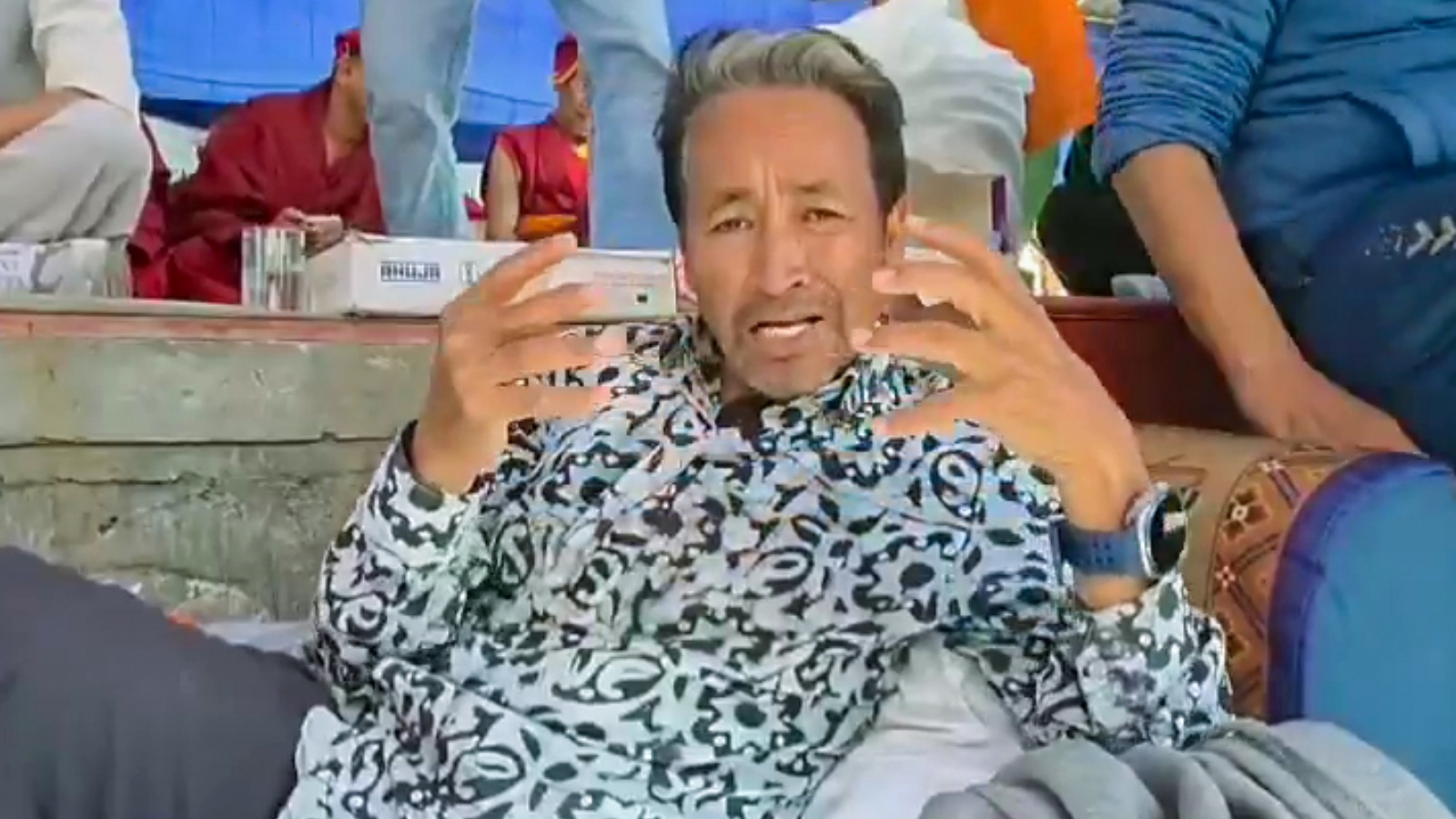Opinion In Ladakh, balance security with sensitivity
Integration must be accompanied by development and dignity, not by coercion or neglect.
 Environmentalist Sonam Wangchuk is leading the protest over statehood demand and inclusion of Ladakh under the Sixth Schedule.
Environmentalist Sonam Wangchuk is leading the protest over statehood demand and inclusion of Ladakh under the Sixth Schedule. Ladakh teaches patience. The thin air at that altitude compels you to slow down; to walk, to breathe, to think in measured rhythm. Life in these mountains is an education in humility: Haste is dangerous, endurance is essential. This is not only biology; it is philosophy. For centuries, Ladakh’s monasteries and mosques, its villages, its caravanserais, have reminded us that permanence is an illusion, balance is a necessity, and dialogue the foundation of survival in a fragile ecology.
Delhi must now learn this Ladakhi wisdom. Delhi has shouldered a historic responsibility since 2019, when Ladakh was carved into a Union Territory. For the first time in contemporary times, Ladakh stands as an equal unit of the Union, not an appendage of Kashmir. This was an act of recognition — of Ladakh’s loyalty, sacrifice, and identity. With that act, however, came Delhi’s special responsibility: To balance security, ecology, and empowerment in a way that secures both the frontier and the faith of its people.
Ladakh is India’s shield — every road, power line, and communication system here strengthens national defence. Delhi cannot allow disaffection to weaken the frontier. Ladakh is one of the world’s most delicate ecosystems. The retreat of glaciers, depletion of aquifers, and unchecked tourism are slow-moving crises that can destabilise the region more surely than enemy guns. Ecological stewardship is a strategic duty. Empowerment here is not an indulgence; it is a necessity. People with a stake in their future stand guard more fiercely than those who feel neglected. Empowerment strengthens security.
In the six years since Ladakh was made a Union Territory, the promises of emancipation from Kashmir’s shadow have collided with the disappointments of centralised rule. A once-quiet frontier, proud of its loyalty and sacrifices for India, now voices its grievances with clarity and unity. The people of Leh and Kargil, often divided by politics and faith, stand together today through the Leh Apex Body and the Kargil Democratic Alliance, in demanding dignity, empowerment, and constitutional safeguards.
Delhi’s response so far has been piecemeal. The presidential regulations of June 2025, which reserve 85 per cent of jobs for locals, recognise five Ladakhi languages, and ensure 33 per cent representation for women in the hill councils, are steps forward. But these concessions, welcome as they are, cannot conceal the deeper malaise — the erosion of local institutions, the defunct hill councils stripped of power, the lack of a public service commission, the sense that outsiders dictate and insiders are marginalised.
The grievances are not only political. The glaciers of the “Third Pole” are retreating faster than anticipated, water is scarcer each year, and unregulated tourism has overwhelmed traditional systems of conservation. A land once sustained by dry toilets and communal stewardship of springs now drowns in plastic bottles and depleted aquifers. Delhi must resist the temptation to treat Ladakh as a canvas for megaprojects that bring outside workers, disrupt nomadic traditions, and devastate fragile pastures. Development in Ladakh must be redefined — small-scale, community-driven, ecologically sensitive.
The most poignant voices are those of Ladakh’s youth — educated, unemployed, disillusioned. They were told that Union Territory status would bring opportunities. Instead, they see vacancies unfilled, exams delayed, and short-term contracts that feel like humiliation. Their despair has spilled onto the streets, most tragically in the protests in the last week of September, when four young lives were lost. It is unconscionable to dismiss these young men and women as “anti-national” or puppets of foreign influence. This is a people whose loyalty is etched in blood. The Ladakh Scouts have defended our highest frontiers since 1947 — from the icy ridges of Kargil to the Galwan Valley in 2020. To question Ladakh’s patriotism is not only unjust — it is strategically foolish. A loyal frontier once alienated cannot easily be won back.
Delhi’s larger dilemma is, of course, real: Ladakh is not merely a land of monasteries and myths, but also of sensitive borders with China and Pakistan. Every administrative decision here has national security implications. But caution cannot mean indifference. Nor can security become a pretext for democratic deficit. A frontier as vital as Ladakh is strengthened not by silencing its people but by empowering them. In fact, empowerment itself is a tool of national security. A Ladakh that feels ownership of its future will stand firmer in defence of the Republic than one that feels ignored. Integration must be accompanied by development and dignity, not by coercion or neglect.
The way forward is simple:
Empower local institutions by strengthening the hill councils and establishing a public service commission.
Adopt an ecological charter, binding on every project, crafted with scientists, monks, imams, and local leaders.
Institutionalise dialogue through a permanent forum for Leh and Kargil, ensuring grievances are addressed before they fester.
Balance security with sensitivity, integrating locals into defence-related infrastructure and decision-making.
The mountains of Ladakh whisper a truth that Delhi often forgets — silence is not consent, speed is not progress, and power without empathy is brittle. Ladakh has been India’s sentinel, its snow warriors and its saints. It has given its loyalty unstintingly. Today, Ladakh asks not for privilege but for partnership. To respond with imagination and humility is not charity but justice. It is also strategic prudence. For a disaffected Ladakh would weaken India’s northern flank; an empowered Ladakh would strengthen it for generations.
The choice is Delhi’s. The wisdom is Ladakh’s. And the time to listen is now.
The writer is dean and professor, School of International Studies, JNU and former member, NSAB



